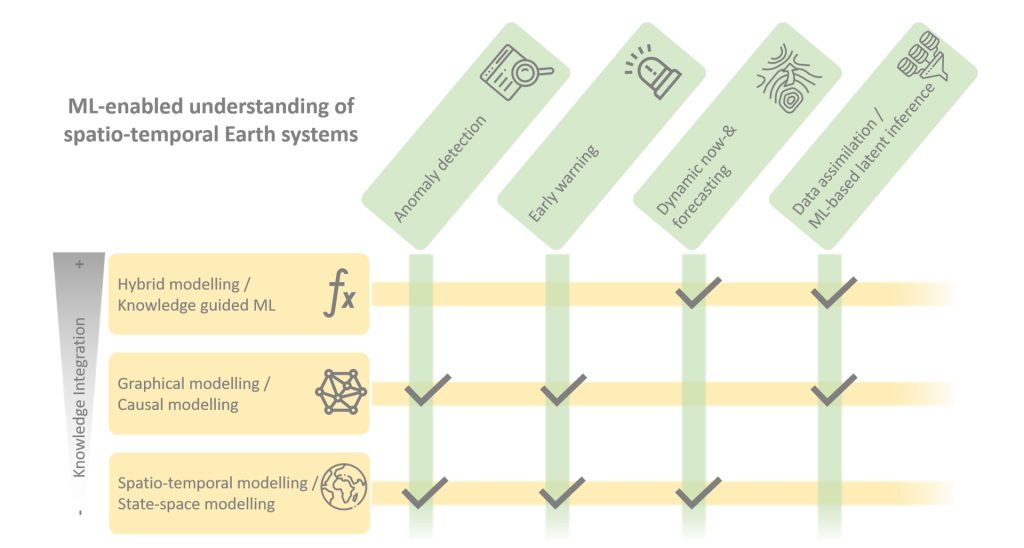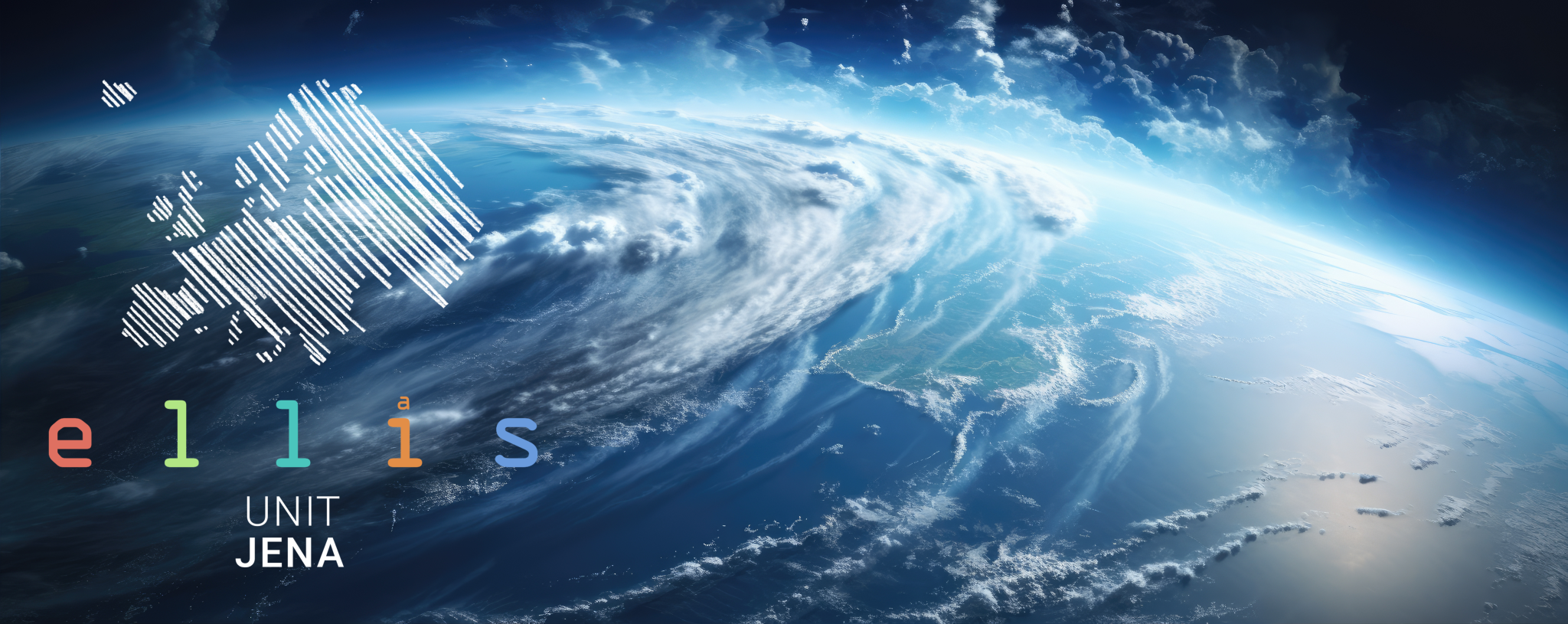
Our team consists of a team of dedicated researchers and scientists led by our two directors Prof. Dr. Markus Reichstein und Prof. Dr. Joachim Denzler. The overall scientific coordination of the ELLIS Unit Jena is carried out by Dr. Conrad Philipp, who brings a wealth of experience and enthuasim to the role.
Prof. Dr. Markus Reichstein, Prof. Dr. Joachim Denzler and Dr. Philipp oversee the strategic development of the ELIS Unit Jena and work closely with our team to ensure that our research is conducted to the highest standards. The aim is to create an interdisciplinary research environment that fosters innovation, collaboration, and communication across different fields. We believe that this approach can lead to new discoveries and breakthroughs that can ultimately benefit society as a whole. see the whole team …
Artificial intelligence and machine learning (AIML) are playing an increasingly important role for modeling and understanding the diverse and interlinked dynamic processes on Earth. Importantly, not only Earth system science benefits from machine learning, but complex Earth system problems can inspire fundamental research in the AIML domain. As in other scientific domains the major challenges relate to interpretability and the integration of machine learning and domain knowledge.
The goal of the ELLIS Unit Jena is thus to combine fundamental development in machine learning (Figure below, rows) with applied challenges concerning spatio-temporal dynamics in the Earth system (Figure below, columns) for a better understanding of the Earth system and its components. An important aspect here is the integration of knowledge into machine learning methods as appropriate assumptions – this can be qualitative knowledge about causal relationships („causal modeling“) or quantitative knowledge about functional relationships, which can be „cast“ into physical, chemical or biophysiological formulas („hybrid modeling“). Causal inference provides a fruitful ground for ML theory and methods, especially for applications in geosciences.
Links between fundamental AIML research and application in the Earth system science. Fruitful bi-directional links in the matrix cells where checkmarks are set.
Causal models are more interpretable by construction and their combination with machine learning constitute a major current research avenue.
A promising approach is to apply causal modeling as basis for explanations, for example, to identify features used for the decision or counterfactuals based on knockoffs.
Complementarily, hybrid modeling aims at combining mechanistic models with machine-learning approaches, allowing for physically more consistent predictions and – scientifically more importantly – non-parametric inference of latent variables.
Overall, we identify at least five major challenges and avenues for the successful development and application of machine learning approaches in the geosciences:
1. Interpretability
Improving predictive accuracy is important but insufficient. Certainly, interpretability and understanding are crucial in this arena, including visualization of the results for analysis by humans. Interpretability has been identified as a potential weakness of deep neural networks, and achieving it is a current focus in deep learning. The field is still far from achieving self-explanatory models, and from causal discovery from observational data. Yet, we should note that, given their complexity, also modern Earth system models are in practice often not easily traceable back to their assumptions, limiting their interpretability as well.
2. Physical consistency
Machine learning models can fit observations very well, but predictions may be physically inconsistent or implausible, e.g. owing to extrapolation or observational biases. Integration of domain knowledge and achievement of physical consistency by teaching models about the governing physical rules of the Earth system can provide very strong theoretical constraints on top of the observational ones.
3. Complex and uncertain data
New machine learning methods are needed to cope with complex statistics, multiple outputs, different noise sources and high dimensional spaces. New network topologies that not only exploit local neighborhood (even at different scales), but also long-range relationships (e.g., for teleconnections) are urgently needed, but the exact cause-effect topologies are even not clear a priori. Modeling of uncertainties will be helped with Bayesian/probabilistic approaches.
4. Limited labels
Unsupervised density modeling and semi-supervised learning, which combine the few labeled samples with the wealth of unlabeled observations, will help in Earth system modeling.
5. Computational demand
There is a huge technical challenge regarding the high computational cost of current geoscience problems.
The ELLIS Unit Jena supports the overall vision of ELLIS by performing foundational research in modern artificial intelligence by advancing both spatio-temporally inspired fundamental machine learning research and applied machine-learning for complex system (i.e. Earth system) understanding including the important aspect of knowledge integration.
The combination of PIs in the unit, with strong expertise in both machine-learning, causal analysis, hybrid modeling and geo-spatio-temporal analysis including statistical inference, together with a proven collaboration among the core and associated members in publication and co-supervision activities, H2020 collaborative projects, and two ERC Grants, puts us in a great position to fundamentally advance both machine learning and geo-scientific aspects.
The researchers of the ELLIS Unit Jena are well connected to the ELLIS Network via the ELLIS program Machine Learning for Earth and Climate Science, the EU project ELISE and individual collaborations with fellows and scholars.
The core members have published more than 50 publications in collaboration with other ELLIS fellows or scholars.
From Jena we are currently organizing a well-attended and stimulating ELLIS webinar, for our ELLIS program, nicely linking Earth science and machine learning interests, and participated in the ELLIS PhD selection in 2020.
Participation in the ELLIS PhD program has successfully started 2020 with a recruitment by Professor Joachim Denzler.
The unit members are committed to contribute to the ELLIS network in various ways, from reviewing and workshop convening, to public relations, outreach to industry, NGOs and policy makers at national, EU and global levels.
Additionally, given the strong academic and high-tech environment in Jena paired with the ELLIS branding, we will continue and increase the attractiveness of the campus for toptalents from the PhD-, to mid-career-, to faculty-level.
The research pursued by the ELLIS Unit is at its core motivated by the desire to explore how environmental and climate sciences can profit from machine learning and artificial intelligence advances to gain a better understanding of Earth dynamic systems. Highlights of this research agenda include fundamental and pioneering work on the evaluation of climate change impacts in the society and the economy. Beyond a purely scientific work, this research will enable the regulatory bodies and policy makers in their decisions and measurements as well as the broader public to get a better grasp.
The ELLIS Unit Jena members – in particular the Co-Directors – complement each other to jointly achieve significant societal and economic impact. On the societal side, Professor Markus Reichstein is part of the German National Committee Future Earth for Sustainability Research by the German Science Foundation, and is chairing the international Knowledge Action Network Extreme Events and Emergent Risks jointly endorsed by global Science organizations from the International Science Council, i.e. World Climate Research Program, Integrated Research on Disaster Risk, Future Earth and WMO´s World Weather Research Programme, and in the Systemic Risk Working group within the United Nations Office for Disaster Risk Reduction (UNDRR), thus with a broad national and international network on sustainability and climate.
On the economic side, Prof. Dr. Joachim Denzler has a strong track record of engaging with joint industry research project as well as industry spin-offs. Multi-year collaborations with top-tier industrial research labs have resulted in a high number of impactful collaborations, joint publications and joint PhD supervision (including Zeiss, Daimler, Jenoptik, Bosch, Continental, Valeo). Within this ELLIS Unit, these collaborations will be further intensified.
In addition, with European projects (European Commision, European Space Agency) research is often carried out in close cooperation with several partners from the Industry, e.g. DEIMOS Remote Sensing (PT), Gamma Remote Sensing (CH), Murmurations SAS (FR), GAEL (FR), Logical Clocks (SE).
Organizing Courses, Summer Schools and Inter-Disciplinary Symposia
The ELLIS Unit Jena faculty are committed to disseminating the most recent advances in their constantly evolving research area as well. This outreach activities cover a wide expertise audience: from young researchers or students in the field to the broad public. Over the years, the faculty have taken a leading role in developing new University courses, offering tutorials at conferences, and organizing summer schools and symposia that bring together researchers with diverse backgrounds. For example Professor Alexander Brenning and Professor Giesen organize respectively the yearly ‘GIS Day’ and the ‘Data Science Day’ where the regional research institutions and private companies in the area share their recent advances on Geo-Informatics and Data Sciences with the scientific and general community. The faculty has also been involved in the organization of the Climate Informatics Workshop Series. Within the framework of the Michael Stifel Center Jena and the IMPRSgBGC Research School, the faculty has also participated or co-organized several talks, workshops and summer schools with focus on machine learning and its application to Earth Sciences: e.g. Dagstuhl Seminar ‘Computer Science meets Ecology” or workshop on “Environmental Informatic Challenges”, among others. The faculty have also taught numerous advanced tutorials and/or challenges at top-tier conferences in ML and AI like the ‘Causality4Climate (C4C)’ NeurIPS competition for causal discovery on climate data challenges in 2019. We will expand these activities within ELLIS and together with other ELLIS units.
Participation in Expert Groups, Regulatory Bodies, and Public Outreach
The ELLIS Unit Jena faculty actively participate in expert groups and frequently advise governmental agencies (from regional to national and European level) regarding the use of artificial intelligence and machine learning in society and its applicability to Earth and Climate sciences. As concrete examples, members of the faculty have been recently involved in the grounding of the Thuringian Centre for Learning Systems and Robotics, actively participate in the IPCC International Panel of Climate Change assessment reports and contribute to the German National Strategy on Sustainability. In addition, unit members integrate the strategic review boards of the Helmholtz Artificial Intelligence Cooperation Unit.
Public Release of Software and Data Artifacts
The ELLIS Unit Jena faculty will continue and intensify their established practice of sharing their research data and software publicly. Examples of such activities is the Cause-me causality benchmark platform which provides ground truth benchmark datasets featuring different real data challenges to assess and compare the performance of causal discovery methods and the EarthNet 2021 challenge.

